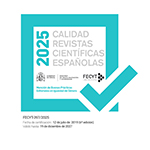Descripción del cambio del TEL al TDL en contexto angloparlante
Resumen
El Trastorno Específico del Lenguaje (TEL) es un trastorno del neurodesarrollo que afecta aproximadamente a un 7% de la población y que compromete a la expresión y/o comprensión del lenguaje oral. Sin embargo, es un trastorno muy desconocido para la población general. Uno de los factores que lo explican es la gran dispersión terminológica que diferentes profesionales y manuales de diagnóstico han utilizado para designarlo. Ante el gran desconocimiento del trastorno y la confusión generada a nivel profesional respecto a la nomenclatura y los criterios diagnósticos Bishop et al. (2016, 2017) llevaron a cabo dos estudios a través del método Delphi en el que participaron diferentes investigadores, profesionales del TEL así como personas de asociaciones de familiares del ámbito angloparlante (consorcio CATALISE). Las principales conclusiones fueron la apuesta por el cambio terminológico hacia el Trastorno del Desarrollo del Lenguaje (TDL) así como unos criterios de diagnósticos que enfatizan en las dificultades funcionales que genera el trastorno y en su pronóstico. En el presente artículo se hace una revisión exhaustiva de todas las implicaciones que los resultados de estos estudios tienen en la conceptualización, la evaluación y la intervención del trastorno. En el ámbito hispanohablante es necesario que se lleve a cabo un trabajo de reflexión y consenso que acuerde la nomenclatura y los criterios de diagnósticos para adaptarlos/ajustarlos al contexto sociocultural y lingüístico de todos los países de habla hispana.
Descargas
Descarga artículo
Licencia
La Revista de Investigación en Logopedia, para fomentar el intercambio global del conocimiento, facilita el acceso sin restricciones a sus contenidos desde el momento de su publicación en la presente edición electrónica, y por eso es una revista de acceso abierto. Los originales publicados en esta revista son propiedad de la Universidad Complutense de Madrid y es obligatorio citar su procedencia en cualquier reproducción total o parcial. Todos los contenidos se distribuyen bajo una licencia de uso y distribución Creative Commons Reconocimiento 4.0 (CC BY 4.0). Esta circunstancia ha de hacerse constar expresamente de esta forma cuando sea necesario. Puede consultar la versión informativa y el texto legal de la licencia.












